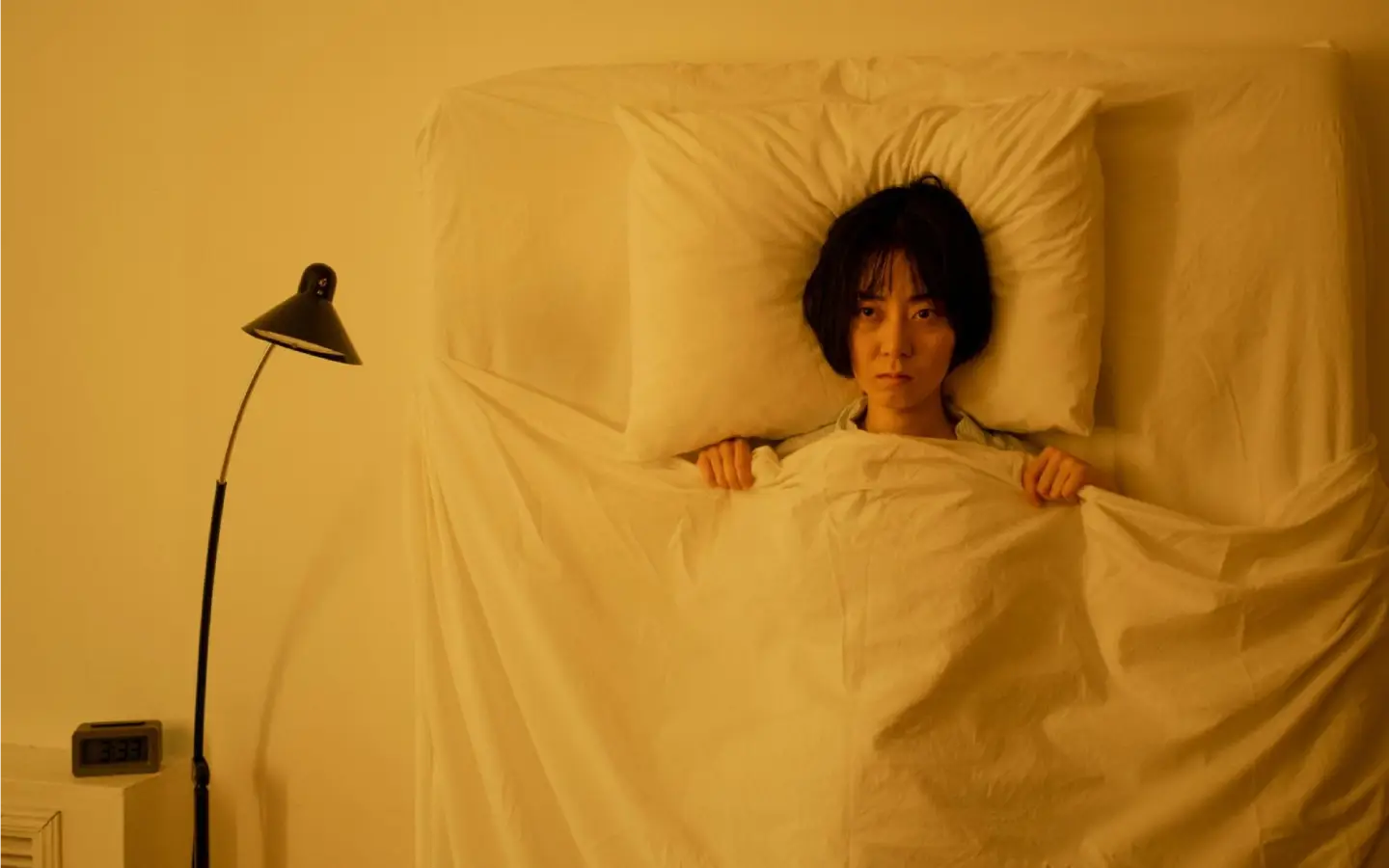November 14, 2025
How Your Stress Hormone Influences the Way You Sleep
Melatonin is the main sleep hormone, but cortisol also affects sleep. While its primary role is regulating your body’s reaction to stress, it also helps with other vital functions such as the immune system, metabolism and the sleep-wake cycle.
In short, high levels of cortisol in the morning help you wake up and get ready to move, while lower levels at night allow you to sleep tight. If your cortisol levels aren’t matching this natural rhythm, sleep quality is the first to suffer.
In this article, we look at how cortisol affects sleep, what happens when its rhythm is disrupted, and how to bring that balance back.
What is Cortisol
Cortisol is a hormone produced through the hypothalamic pituitary adrenal (HPA) axis. This is a communication pathway between your brain and adrenal glands that regulates how your body responds to stress and maintains internal stability. It includes the hypothalamus and pituitary gland in the brain and the adrenal glands that sit on top of your kidneys.
When you are dealing with any kind of stress, the hypothalamus releases corticotropin-releasing hormone (CRH). That triggers the pituitary gland to release adrenocorticotropic hormone (ACTH), which signals the adrenal glands to produce cortisol and adrenaline. These hormones help the body respond properly by increasing alertness, blood flow, and available energy. This is basically how fight-or-flight mode works.
Cortisol helps your body:
- Stay alert and focused during the day
- Mobilize energy when you need to think, move, or handle challenges
- Regulate inflammation and support recovery
- Maintain blood pressure, immune function, and metabolism
When it comes to cortisol and sleep connection, it gets a bit complicated.

How Does Cortisol Affect Sleep?
Because cortisol interacts with most organ systems in the body, it must follow a rhythm determined by the circadian clock. Typically, cortisol levels are highest in the morning to help you wake up, then decrease throughout the day. Stress, irregular bedtimes, or too much light at night can disrupt this normal rhythm, making it harder to sleep.
1. Trouble Falling asleep
If cortisol stays high at night, your body stays alert. Heart rate and brain activity remain elevated, and you may feel tired but unable to switch off. Studies show that when the HPA axis is more active and cortisol levels are more than normal values too close to bedtime, people tend to take longer to fall asleep and spend less of the night actually sleeping.
2. Depth of sleep
Sleep is not one single stage. You move through light sleep, deep sleep, and REM. Deep sleep helps physical recovery, while REM supports memory and emotional processing.
When cortisol is elevated at night, especially in the first half of the night, it is linked with:
- More fragmented sleep
- Less deep sleep
- More awakenings or partial arousals
Research reviewing people with insomnia and short sleep duration finds that, on average, they have moderately higher cortisol levels across 24 hours compared to good sleepers, which fits the idea of a body that does not fully shift into a restful state.
3. Early awakenings
Cortisol is supposed to rise in the last part of the night to prepare you for waking. If your baseline levels are already high, this natural rise can be enough to wake you too early and make it harder to fall back asleep. Research has shown that higher late-night and early-morning cortisol are common in insomnia and sleep apnea.
4. The feedback loop between cortisol and sleep
Poor sleep does not only result from cortisol. It can also raise stress levels further.
Sleep restriction studies show that getting significantly less sleep for several nights can increase late afternoon and early evening cortisol, even if total 24-hour production does not change much.
So you can end up with a loop:
Less sleep → more stress on the body → higher cortisol at the wrong time → even worse sleep.
Does High Cortisol Cause Insomnia?
Many people with chronic insomnia show signs of hyperarousal, which is a state where the body and brain remain more activated than they should be at night. Cortisol and other stress signals are part of that picture.
Typical patterns you might notice if high cortisol and sleep are connected for you:
- You feel sleepy during the day, but once you lie down, your mind stays active
- You wake up in the middle of the night with your heart beating fast
- You wake up too early and cannot fall back to sleep even though you still feel tired
- You get enough hours in bed, but sleep feels light and you wake unrefreshed
To be clear, not everyone with insomnia will have clearly measurable high cortisol, and not everyone with high cortisol will have insomnia. But the overlap is strong enough that it is worth considering.
[CTA_INSERT]
How to Support Healthier Cortisol Levels and Sleep
The truth is, you cannot control every stressor in life, but you can influence how your body responds and help it recover faster.
1. Keep your sleep and wake times consistent
Try to go to bed and get up at roughly the same time every day, including weekends. Having a regular sleep schedule gives your HPA axis and circadian clock a clear pattern to follow and makes it easier for cortisol and melatonin to be released at the right time.
2. Use light the right way
Get natural light in your eyes within the first hour after waking, ideally outside. This supports a healthy cortisol rise in the morning and helps keep your internal day aligned with the external one.
At night, dim the lights and reduce screen exposure in the hour before bed so your brain can start its night mode more easily.
3. Create a wind-down routine
Your nervous system needs a transition between problem-solving mode and sleep mode. This is what wind-down routine helps you with. Dedicate 30–60 minutes before bed to:
- Read a book
- Do some gentle stretching or yoga
- Breathing exercises, such as 4-7-8 breathing
- Journal to clear out mental noise
A great thing about these activities is they are simple, repeatable, and do not add new stimulation or stress to your system.
4. Avoid caffeine and alcohol
If you are sensitive to sleep issues, consider stopping caffeine by early afternoon and avoid alcohol in the evening hours, as these can make it harder to fall asleep or cause sleep fragmentation.
5. Move your body, but not too late
Regular movement supports better stress resilience and can help you normalise your cortisol over time. Try to do higher intensity activity earlier in the day, and leave evening for lighter forms of movement that actually help you relax.
6. Address daytime stress, not only bedtime
Cortisol issues that show up at night often begin during the day. Short breaks, realistic workload, social support, and even short walks outside can all lower the pressure on your stress system so it has an easier job at night.
If, after all this, sleep still feels shallow and your body does not “believe” that it is safe to rest, you might need an extra kind of support that works directly on the feeling of safety.

How Kimba Helps You Relax and Sleep More Deeply
Even when you do everything right, your body still needs time to adapt – and that’s where personal limbic therapy with Kimba helps.
Kimba connects to your wearable and tracks signals such as HRV, restlessness, and other stress markers through the night. When it detects that your nervous system is tense or drifting toward lighter sleep, it releases a brief, targeted burst of scent designed to support the limbic system, the part of the brain that processes stress and safety.
Scent reaches these areas quickly and does not require conscious effort. Over time, your brain starts to link these scent cues with calm. That helps your body shift out of “fight-or-flight" mode and into a state where deeper sleep is more likely to happen.
Kimba does not replace medical care, and it does not directly change your cortisol levels. It is there to support your nervous system, not override it.
Join our waitlist and experience how scent therapy helps your body recover more deeply after stress.
What to Remember
- Cortisol is your main stress hormone, but also a key part of your sleep–wake rhythm.
- Cortisol levels should be higher in the morning and lower at night.
- When cortisol stays high in the evening, it can delay sleep, keep you in lighter stages, and cause early awakenings.
- Chronic stress, irregular schedules, caffeine, alcohol, some medical conditions, and sleep loss itself can all disrupt cortisol levels.
- Supporting your rhythm with consistent routines, light exposure, and stress regulation is a strong first step.
- Kimba adds real-time support at night, using scent to speak directly to the parts of the brain that decide whether it is safe to sleep.


Continue reading

What Causes Nightmares in Adults?

How High Training Load Can Disrupt Sleep Quality


